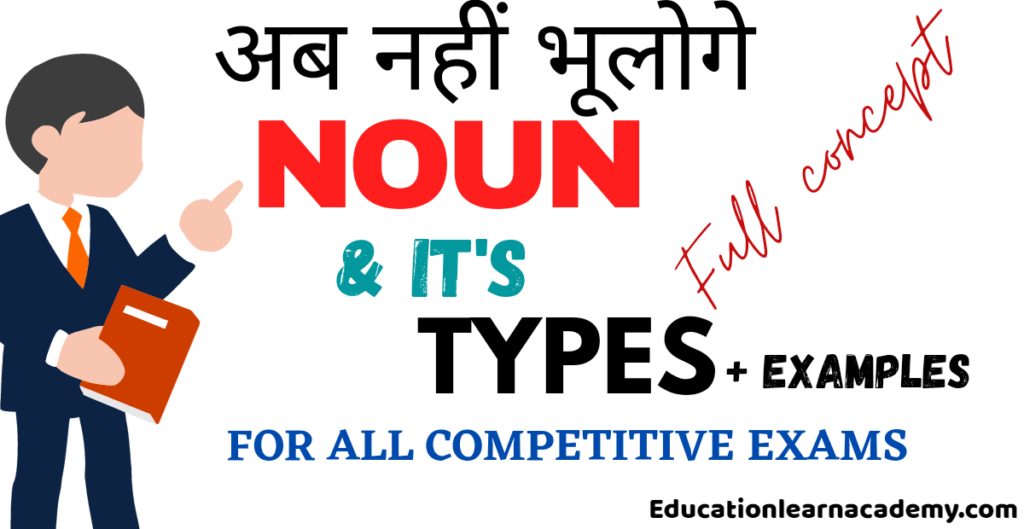Noun (संज्ञा): Definition & Types…
किसी भी प्राणी, जगह या वस्तु के नाम को संज्ञा कहते हैं।
A noun is the name of a person (creature), place, or thing.
Don’t we have questions like:
1) Police is/has or Police are/have? (Both are correct; but WHEN & HOW)
2) India is/has or India are/have? (Both are correct; but WHEN & HOW)
3) Mathematics, Physics, Air, Water, Sunlight – Which noun are they?
4) Why is the word “GRIEF” a noun but not “SAD“?
5) Why is the word “JOY” a noun but not “HAPPY“?
6) How is the word “MONEY” an uncountable noun when we all know, it can be counted?
7) How is the word “STAR” a countable noun when we all know, it can’t be counted?
- Read More: Irregular Verbs | Irregular Verbs List in English 2021
- Verb Forms – महत्वपूर्ण Three Forms of Verb – Verb Forms Free PDF के साथ
- Prepositions of Position and Direction in English Free Course 2021
- Read More: Tense in English Grammar in Hindi – Types, Rules, Charts, PDF 2021
- Read Also: Active and Passive Voice Rules, Example, Exercise for Competitive Exam 2021

Don’t worry! All these questions will be answered….
Nouns Definition in Hindi and Examples – संज्ञा की परिभाषा और उदाहरण
किसी भी व्यक्ति, वस्तु, जाति, भाव या स्थान के नाम को संज्ञा कहते हैं।
जैसे – मनुष्य (जाति), अमेरिका, भारत (स्थान), बचपन, मिठास (भाव), किताब, टेबल(वस्तु) आदि।
निम्नलिखित उदाहरणों से हम संज्ञा को अच्छे से समझ सकते हैं –
उदाहरण 1 –
सुरेश भाषण प्रतियोगिता में प्रथम आया था। इसलिए वह दौड़ता हुआ स्कूल से घर पहुँचा, इस बात को आपने माता-पिता को बताते हुए वह बहुत खुश लग रहा था। यह बात सुनकर सुरेश के माता-पिता बहुत आनंदित हुए और उन्होंने उसे गले लगा लिया।
इन पंक्तियों में –
सुरेश, माता-पिता (व्यक्ति)
स्कूल, घर (स्थान)
खुश, आनंदित (भाव)
आदि संज्ञा प्रयुक्त हुई है।
उदाहरण 2 –
भारत एक लोकतांत्रिक देश है। नरेंद्र मोदी भारत के प्रधानमंत्री हैं। हॉकी भारत का राष्ट्रीय खेल है। गंगा भारत की एक पवित्र नदी है। कुरान मुसलमनों का पवित्र ग्रन्थ है। त्योहारों से हर घर में ख़ुशी आती है। आज दीपक बहुत खुश है। दीपक हर सुबह एक गिलास दूध और चार अंडे खाता है।
इन वाक्यों में चिह्नित शब्द किसी न किसी तरह से संज्ञा से सम्बंधित हैं-
भारत – देश का नाम
नरेंद्र मोदी – व्यक्ति का नाम
हॉकी – खेल का नाम
गंगा – नदी का नाम
कुरान – ग्रन्थ का नाम
मुसलमनों – विशेष समुदाय का नाम
ग्रन्थ – किसी किताब की विशेष श्रेणी का नाम
ख़ुशी – एक प्रकार का भाव
गिलास – वस्तु का नाम
दूध, अंडे – खाद्य पदार्थ का नाम
Types of Noun (संज्ञा के प्रकार)
- Proper noun (व्यक्तिवाचक संज्ञा) – It refers to the name of a specific person, place or thing.
- Common noun (जातिवाचक संज्ञा) – It refers to the name of a class of a person, place or thing.
- Material noun (पदार्थवाचक संज्ञा) – It refers to the name of a material or substance.
- Collective noun (समूह वाचक संज्ञा) – It refers to the name of a group of persons, places or things.
- Concrete Noun (यथार्थपूर्ण संज्ञा) – It refers to anything that can be experienced through any of our five senses (Sight, Hearing, Smell, Touch & Taste). In other words, it’s anything that has a physical existence.
- Abstract noun (भाववाचक संज्ञा) – It refers to anything that can’t be experienced through any of our five senses. It’s, in fact, the name of an idea, a feeling, an emotion, a quality, a concept, a state, an event, or anything at all that doesn’t have a physical existence.
- Countable Noun (गणनीय संज्ञा) – That can be counted.
- Uncountable Noun (अगणनीय संज्ञा) – That cannot be counted.
- Gerund (क्रियावाचक संज्ञा) – A verb form (Verb + ing) that acts as a noun.
- Infinitive (क्रियार्थक संज्ञा) – A verb form (To + Verb) that acts as a noun.
Types of Noun (संज्ञा के भेद )
All words which we used in a sentence as a name, person, place or thing etc all are comes under the classification of Noun.
(संज्ञा के अंतर्गत वह शब्द आता है जो किसी भी व्यक्ति, स्थान या वस्तु के रूप में वाक्य में प्रयोग किया जाता है , सभी शब्द संज्ञा के वर्गीकरण के अंदर आता है। )
Noun is classified into five parts. (संज्ञा पांच भागों में वर्गीकृत किया गया है )
1) Proper Noun (व्यक्तिवाचक संज्ञा ) .
2) Common Noun (जातिवाचक संज्ञा ).
3) Collective Noun (समूहवाचक संज्ञा ).
4) Material Noun (द्रववाचक संज्ञा ).
5) Abstract Noun (भाववाचक संज्ञा ).
1) Proper Noun (व्यक्तिवाचक संज्ञा ):
A Noun which belongs to a particular or individual name, person, place or thing is called as proper noun.
(जो किसी भी व्यक्ति, स्थान या वस्तु का बोध कराता है, उसे व्यक्तिवाचक संज्ञा कहते है।
For example:
Yamuna (यमुना )
Meena (मीना)
Mumbai (मुंबई).
The following sentences contain examples of proper noun:
Yamuna ek nadi hai. (यमुना एक नदी है। ) – Yamuna is a river.
Meena Khel rahi hai. (मीना खेल रही है। ) – Meena is playing.
2) Common Noun(जातिवाचक संज्ञा ):
Common nouns are the words which name the place, people, things etc but they are not the actual name of the place, people or things. For instance, “boy” is a common noun and the boy’s name is “Arun” which is proper noun as it specifies the name.
(वैसे नाम जिनसे जाति भर का बोध हो उसे जातिवाचक संज्ञा कहते है। )
For example:
Gaon (गांव ) – Village
Pashu (पशु) – Animal
Pahad (पहाड़ ) – Hill
The following sentences contain examples of common noun:
Gaon bhut chota hai (गांव बहुत छोटा है ) – village is very small
Pashu jungle me rahte hai. (पशु जंगल में रहता है ) – Animal is lives in forest.
3) Collective Noun (समूहवाचक संज्ञा ):
Name have been assigned to some special groups is called collective noun.
(वैसा संज्ञा जिससे पूरे समूह का बोध हो उसे समूहवाचक संज्ञा कहते है। )
For example:
Bheed (भीड़) – Crowd
Bunch (गुच्छा ) – Bunch
Mall me bhut bheed hai (मॉल में बहुत भीड़ है ) – Mall is fully crowded.
Angoor ka guchha. (अंगूर का गुच्छा।) – Bunch of grapes.
4) Material Noun (द्रववाचक संज्ञा ):
Nouns that refer to the names of a liquid or matter is called as material noun.
(वैसा संज्ञा जो तरल अवस्था मे हो जिसकी गिनती संभव नही हो सकती है उसे द्रववाचक संज्ञा कहते है।
For example:
His anger knows no limits. (उनका गुस्सा कोई सीमा नहीं जानता).
Gold is so expensive. (सोना बहुत महंगा है। )
5) Abstract Noun (भाववाचक संज्ञा ):
Abstract Noun is the word which is used as the name of quality, action that quality and action is considered as an object is called abstract noun.
(वैसा संज्ञा जिसका रूप और आकार नही होता है केवल गुण का आभास होता है उसे समूहवाचक संज्ञा कहते है।)
For example:
Beauty (सुुुंदर )
Kind (दयालु )
Honest (ईमानदार )
Reena bhut sundar hai (रीना बहुत सुंदर है। ) – Reena is very beautiful.
Ram bhut imandaar hai (राम बहुत ईमानदार है। ) – Ram is very honest.
VIDEO # 1
Proper noun (व्यक्तिवाचक संज्ञा) – It refers to the name of a specific person, place or thing.
Examples: Ravi, Rashmi, Tuffy, Delhi, India, Usha, Reynolds, Taj Mahal, etc.
Common noun (जातिवाचक संज्ञा) – It refers to the name of a class of a person, place or thing.
Examples: Boy, Man, Girl, Woman, Lady, Dog, Cat, Place, City, State, Country, Animal, Building, Pen, Shop, Mobile etc.
Material noun (पदार्थवाचक संज्ञा) – It refers to the name of a material or substance.
Examples: Gold, Silver, Salt, Air, Water, Stone, Sand, Sunlight, Milk, Earth, Rain, Fibre, Cement, Brick, Ghee, Cloth etc.
Collective noun (समूह वाचक संज्ञा) – It refers to the name of a group of persons, places or things.
Examples: People, Crowd, Police, Team, Herd, State, Country, Fleet, Committee, Audience, Choir, Jury etc.
Police is/are = ? & Team is/are = ?
When the term Police is used as a unit/a department/an organization, it’s considered as a SINGULAR; whereas when it is used to refer to the individuals (members) of the department, it’s considered as a PLURAL.
The same goes for the word TEAM.
Police as a unit:
1) The police is investigating it.
2) The police has been searching that criminal for a long.
Police as Individual officers:
1) The police are patrolling in my area to maintain peace.
2) The police have enjoyed the party with their families.
Team as a unit:
1) The team is going to England next month.
2) The team has received an award for their good performance in the recent series.
Team as Individual players:
1) The team are shopping today because they want to be relaxed.
2) The team have performed exceptionally well in today’s match.
Good to know:
INDIA as a country:
1) India is the fifth-largest economy in the world.
2) India has a population of 133 crores.
INDIA as a Team:
1) India have 11 players.
2) India have won the match.
VIDEO # 2
Concrete Noun (यथार्थपूर्ण संज्ञा) is anything that exists physically. It can be experienced through any of our five senses (Sight, Hearing, Smell, Touch & Taste). And, Abstract (भाववाचक संज्ञा) refers to anything that doesn’t exist physically and hence, can’t be experienced through any of our five senses.
An abstract noun is the name of an idea (Wisdom, Knowledge, Democracy, Beliefs, Friendship, etc.) a feeling/emotion (Pain, Anger, Hate, Joy, Love, Happiness, Sadness, Confusion, etc.), a quality (Beauty, Dedication, Honesty, Patience, Trust, etc.) or anything at all that doesn’t have a physical existence.
